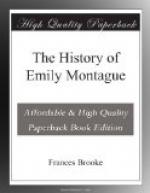There is a lady here, whom I wish you to see, as the shortest way of explaining to you all I mean; she is the most pleasing woman I ever beheld, independently of her being one of the handsomest; her manner is irresistible: she has all the smiling graces of France, all the blushing delicacy and native softness of England.
Nothing can be more delicate, my dear Temple, than the manner in which you offer me your estate in Rutland, by way of anticipating your intended legacy: it is however impossible for me to accept it; my father, who saw me naturally more profuse than became my expectations, took such pains to counterwork it by inspiring me with the love of independence, that I cannot have such an obligation even to you.
Besides, your legacy is left on the supposition that you are not to marry, and I am absolutely determined you shall; so that, by accepting this mark of your esteem, I should be robbing your younger children.
I have not a wish to be richer whilst I am a batchelor, and the only woman I ever wished to marry, the only one my heart desires, will be in three weeks the wife of another; I shall spend less than my income here: shall I not then be rich? To make you easy, know I have four thousand pounds in the funds; and that, from the equality of living here, an ensign is obliged to spend near as much as I am; he is inevitably ruined, but I save money.
I pity you, my friend; I am hurt to hear you talk of happiness in the life you at present lead; of finding pleasure in possessing venal beauty; you are in danger of acquiring a habit which will vitiate your taste, and exclude you from that state of refined and tender friendship for which nature formed a heart like yours, and which is only to be found in marriage: I need not add, in a marriage of choice.
It has been said that love marriages are generally unhappy; nothing is more false; marriages of meer inclination will always be so: passion alone being concerned, when that is gratified, all tenderness ceases of course: but love, the gay child of sympathy and esteem, is, when attended by delicacy, the only happiness worth a reasonable man’s pursuit, and the choicest gift of heaven: it is a softer, tenderer friendship, enlivened by taste, and by the most ardent desire of pleasing, which time, instead of destroying, will render every hour more dear and interesting.
If, as you possibly will, you should call me romantic, hear a man of pleasure on the subject, the Petronius of the last age, the elegant, but voluptuous St. Evremond, who speaks in the following manner of the friendship between married persons:
“I believe it is this pleasing intercourse of tenderness, this reciprocation of esteem, or, if you will, this mutual ardor of preventing each other in every endearing mark of affection, in which consists the sweetness of this second species of friendship.
“I do not speak of other pleasures, which are not so much in themselves as in the assurance they give of the intire possession of those we love: this appears to me so true, that I am not afraid to assert, the man who is by any other means certainly assured of the tenderness of her he loves, may easily support the privation of those pleasures; and that they ought not to enter into the account of friendship, but as proofs that it is without reserve.




